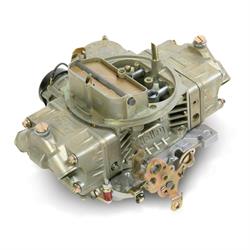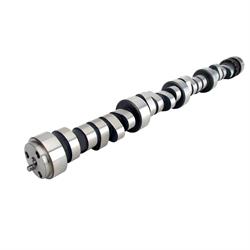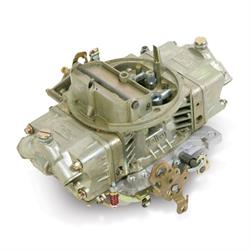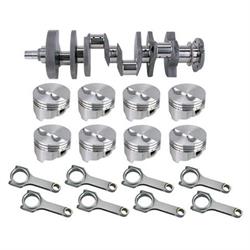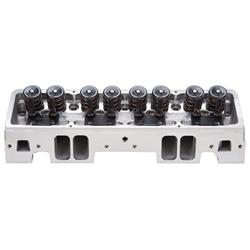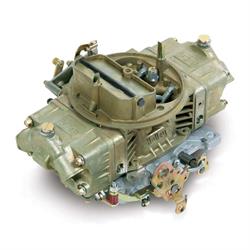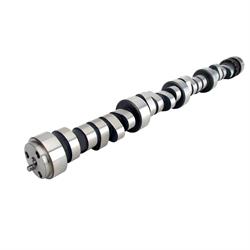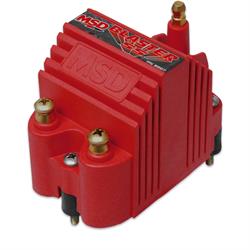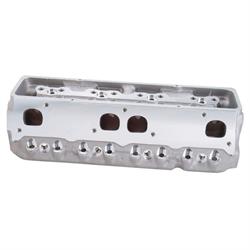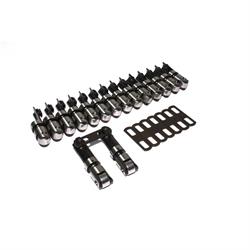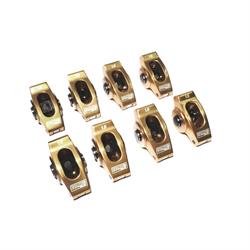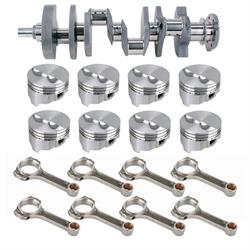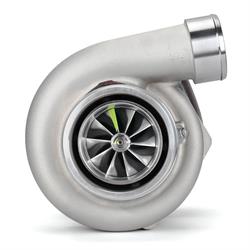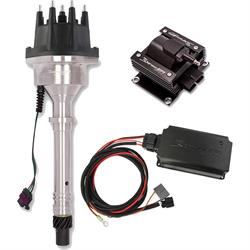SBC 350 Build Combinations: Recipes for 300-600+ HP
What to Know Before Building an SBC 350
With so many people building LS engines these days to drop into their muscle car or classic pickup, many may ask is the Chevy 350 a good engine to still build these days. The answer from us? A resounding yes! As good as the LS engine is, the small block Chevy (both Gen 1 and Gen 2) have nearly 70 years of production and aftermarket support behind them. This means that whatever your horsepower level desire and budget may be, there are aftermarket parts to support your Chevy 350 upgrades.
While there are millions of small block Chevy engines sitting around waiting to be scooped up for a song to build, and you may even have one already sitting in the corner of your shop, it’s certainly important to know just what you’re looking at and what’s the best 350 Chevy engine to start your build with. The small block Chevy casting numbers will tell you exactly what you have, as externally, it is difficult to tell whether you’re looking at a two-bolt 307 small block Chevy or an SBC 350 4-bolt main engine. The 2 bolt vs 4 bolt main 350 is just one of the decisions you’ll need to make, and knowing the power level you’re building for will help with these decisions.
Speaking of 2 bolt vs 4 bolt main 350, let’s dive a little deeper into how much hp can a 2 bolt main 350 handle and what is a 350 4 bolt main. The factory 2 bolt main block has been produced in large numbers, making them easier to source and available at a lower cost, helping the bottom line of your budget. The factory 2 bolt main blocks are suitable for moderate horsepower levels you’d find in the typical street performance build. If you’re planning a basic junkyard 350 small block build under 400 horsepower the two bolt main block is up to the task. Especially when you consider a stock Chevy 350 hp rating from the factory has been as high as 330 horsepower.
When it comes to the four bolt main 350, the increased block strength and crankshaft support is preferred for higher horsepower builds of a small block Chevy where you’re looking to exceed 400 horsepower via a stroker kit, or power adder like in a turbo SBC build.
Stock SBC 350 Chevy Engine Horsepower
When people ask how much horsepower does a stock 350 have, it is very much dependent on the original application. There are 350 Chevy engines that were delivered in the 3rd gen C10 pickup (just one example) that barely cracked 175 hp thanks to emissions and other issues throughout the late 1970s. Of course, the opposite end of that spectrum is the heyday of GM muscle cars like Nova, Chevelle, and Camaro that all saw 300 plus horsepower 350 small blocks in the 1960s. Today, with the right Chevy 350 build parts list it is extremely easy to exceed these factory horsepower numbers. So when considering how much hp does a Chevy 350 have, don’t get too hung up on the factory numbers, as you can build above and beyond those factory numbers.
How Much HP Can a 350 SBC Make?
When it comes to Chevy 350 horsepower upgrades the first question often asked is how much hp can a 350 handle? We all know that when it comes to reliability and build cost is the Chevy 350 a good engine that can make respectable power still to this day. The Chevy 350 max hp question really comes down to your Chevy 350 build parts list and your budget for said parts. You’re obviously not going to make a max horsepower effort with a 350 Chevy budget build. That said, while a stock 350 Chevy may only have 200 or so hp, you can easily make 300 horsepower with a 350 Chevy budget build and upwards of 600 horsepower with a Chevy 350 max hp build with the right combination of parts used. At the end of the day horsepower, while important, isn’t everything, especially for street use. We can’t forget how important torque is when comparing horsepower vs torque in a small block 350 Chevy build of any level.
The Best SBC 350 Heads
When you get right down to it, an engine is essentially an air pump. Filling the cylinders with as much air (and fuel) as possible before compressing it and igniting the mixture is the way to make power. To that end, anything you can do to increase the airflow into and out of the engine is critical to the engine’s efficiency and optimizing engine performance. One of the best Chevy 350 upgrades you can make to increase airflow into the engine is a high flowing set of aluminum cylinder heads. The modern 18-degree cylinder head will provide more airflow, but at the expense of often requiring special intake and/or exhaust manifolds due to relocated intake and/or exhaust ports, offset lifters, and even different pistons. Sticking to the standard 23-degree cylinder head will allow for more standardized small block Chevy components to be used and provide more low end torque, which is essential for street applications, due to the slightly smaller intake runner volume.
Speedway Motors offers several great 23-degree cylinder head options for your Chevy 350 upgrades:
- Chevy SBC Assembled Aluminum Camel Double Hump 461 Cylinder Head
- World Products Motown 220 Iron Cylinder Heads
- Air Flow Research 1001 SBC 195 Enforcer Head, Straight, Assembled
- Dart 127121 SHP 180CC Assembled Engine Cylinder Head-Small Block Chevy
- Edelbrock 60739 Performer RPM Cylinder Head, Chevy 302,327,350,400
- Flo-Tek 102505 Assembled S/B Chevy Aluminum Head, Straight Plug
SBC 350 Chevy Budget Build Recipe
So, how much does it cost to build a 350 engine anyway? We know not everyone has the deep pockets for the Chevy 350 horsepower upgrades that they really want, so let’s discuss the typical 350 Chevy budget build using a junkyard 350 small block as a starting point. Assuming your 350 Chevy find is the standard two bolt main block and in rebuildable condition where you’ll reuse the crankshaft and connecting rods, a basic piston and ring package, performance camshaft, and a budget set of cylinder heads will make for a nice reliable small block Chevy that you can grow into with better heads, cam, induction, or even a power adder down the road. This isn’t a 400 hp 350 Chevy recipe by any means, but it should get you closer to 275-300 hp, which is certainly fun on the street, especially in a light chassis like a fiberglass hot rod or an early muscle car. To summarize, a junkyard 350 small block build should run you under $2,000, not including any required machine work, but can go as high as $3,000 with additional performance parts upgrades. If you’re willing to go a little bit deeper into your wallet you could top off your rebuilt block with something like our top end kit for a nice bump in horsepower and torque.
No matter your budget, you’ll want to consider things like ignition and charging systems, and cooling systems as part of your build budget. This is especially important if you’re building from scratch and do not have serviceable components already on your project vehicle to use. This is common in swap projects, as the small radiator used by an inline-four or V6 will generally not be enough to cool a V8. So, adding things like a new alternator of the proper output, a gear reduction mini-starter, and new high-flow radiator are all things that affect your 350 Chevy build budget.
With that out of the way, let’s consider some Chevy 350 build parts list options for higher power levels. Obviously, these will hit your budget at a greater price, but will also provide more horsepower and torque with higher quality parts that will provide many years of high performance use. Hit the link found with each build list to view the build list parts availability and pricing and see how much horsepower you can get for your 350 small block performance build dollars. We start with a nice basic Chevy 350 build parts list and move through such options as 400 hp 350 Chevy recipe, 500 hp 350 Chevy recipe, and even a 350 SBC turbo build.
350 HP SBC 350 Build Recipe
350 HP 350 SBC Build Parts List (view price and availability)
400 HP SBC 350 Build Recipe
400 HP 350 SBC Build Parts List (view price and availability)
450 HP SBC 350 Build Recipe
- 383 Chevy Rotating Assembly
- Dart SHP 200CC Assembled Aluminum Cylinder Head (two quantity)
- COMP Cams Xtreme Energy Hydraulic Roller Camshaft
- COMP Cams High Energy Hydraulic Roller Lifters
- Cloyes Roller Timing Chain Kit
- Roller Tip Rocker Arms and Push Rods
- Holley 700 CFM Double Pumper Carburetor
- Edelbrock Performer Air-Gap Intake Manifold
- SBC HEI Distributor
450 HP 350 SBC Build Parts List (view price and availability)
500 HP SBC 350 Build Recipe
500 HP 350 SBC Build Parts List (view price and availability)
550 HP SBC 350 Build Recipe
- Dart SHP Chevy Block, 4.125 Inch Bore
- 421 Chevy Rotating Assembly
- Edelbrock Victor Jr. 23 Degree Cylinder Head (two quantity)
- COMP Cams Xtreme Energy Hydraulic Roller Camshaft
- COMP Cams High Energy Hydraulic Roller Lifters
- Cloyes Roller Timing Chain Kit
- COMP Magnum Roller Tip Rocker Arms
- Holley 850 CFM Carburetor
- Edelbrock Super Victor Intake Manifold
- MSD Billet Distributor
- MSD 6AL Digital Ignition Control Box
- MSD Blaster SS Coil
550 HP 350 SBC Build Parts List (view price and availability)
600 HP SBC 350 Build Recipe
- Dart SHP Chevy Block, 4.125 Inch Bore
- 421 Chevy Rotating Assembly
- Brodix 11 X Series/23 Degree Cylinder Heads (two quantity)
- COMP Cams Magnum Solid Roller Camshaft
- COMP Cams Endure-X Solid Roller Lifters
- Cloyes Roller Timing Chain Kit
- COMP Ultra Gold Full Roller Rocker Arms (two quantity)
- Quick Fuel 850 CFM Race Carburetor, Mechanical Secondary
- Edelbrock Super Victor Intake Manifold
- MSD Billet Distributor
- MSD 6AL Digital Ignition Control Box
- MSD Blaster SS Coil
600 HP 350 SBC Build Parts List (view price and availability)
SBC 350 Turbo Build Recipe
- Forged 350 Chevy Rotating Assembly
- Flo-Tek Assembled SBC Aluminum Head (two quantity)
- VS Racing Gen2 67/62 Cast Turbo
- SBC Hydraulic Camshaft
- COMP Cams High Energy Chevy Hydraulic Lifters
- Cloyes Roller Timing Chain Kit
- Roller Tip Rocker Arms and Push Rods
- SBC Dual Plane Intake and Holley Sniper 2 EFI Kit
- Holley Sniper Hyperspark Ignition System
350 SBC Turbo Build Parts List (view price and availability)
SBC 350 Torque Build Recipe
350 SBC Torque Build Parts List (view price and availability)
How Long Do Chevy 350 Engines Last?
Like any piece of machinery, the small block Chevy engine’s lifespan depends on several factors, including proper assembly, quality of the internal parts, regular maintenance and adjustments, and the manner in which the engine is used. Assembling a 350 Chevy with proper machining steps and quality SBC upgrades will go a long way in providing a commendable service life. Regular maintenance, including oil changes with high quality motor oil, along with mild operation (highway mileage, moderate rpm use, etc.) will also play a positive role in a small block Chevy’s ability to achieve upwards of 200,000 miles of service.
Conversely, a 350 Chevy built with subpar internal parts and poor machining may lead a very troubled and short life. Add in the additional strain that some SBC upgrades bring to the table, such as stroker kits, high lift cams, and power adders, along with the lack of or poor maintenance routines, and extended high rpm use (yes, it all sounds like fun, but it does “ding” you in the engine life department), and you may be doing the work all over again in no time. Obviously, a built engine with a lot of work done to it may see fewer miles than a budget build being tossed into a daily driver. So, in the end the amount of time behind the wheel may be equal. Meaning, a well built budget engine may see 200,000 miles in your daily driver over ten years of use, but a performance-built small block that is driven hard only a few times a month in your “toy” may only last 75,000 miles but take the same ten years to rack up those miles.











